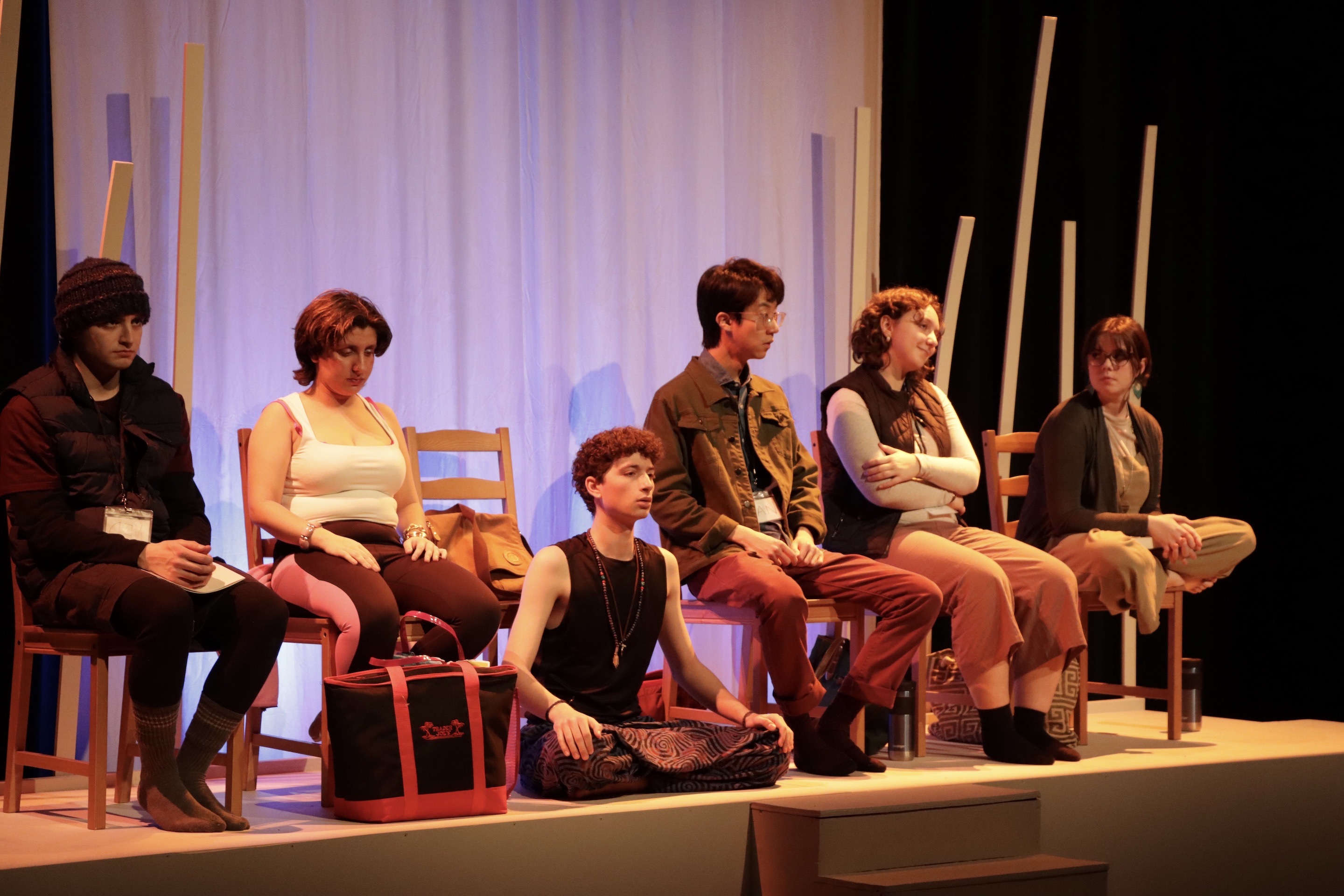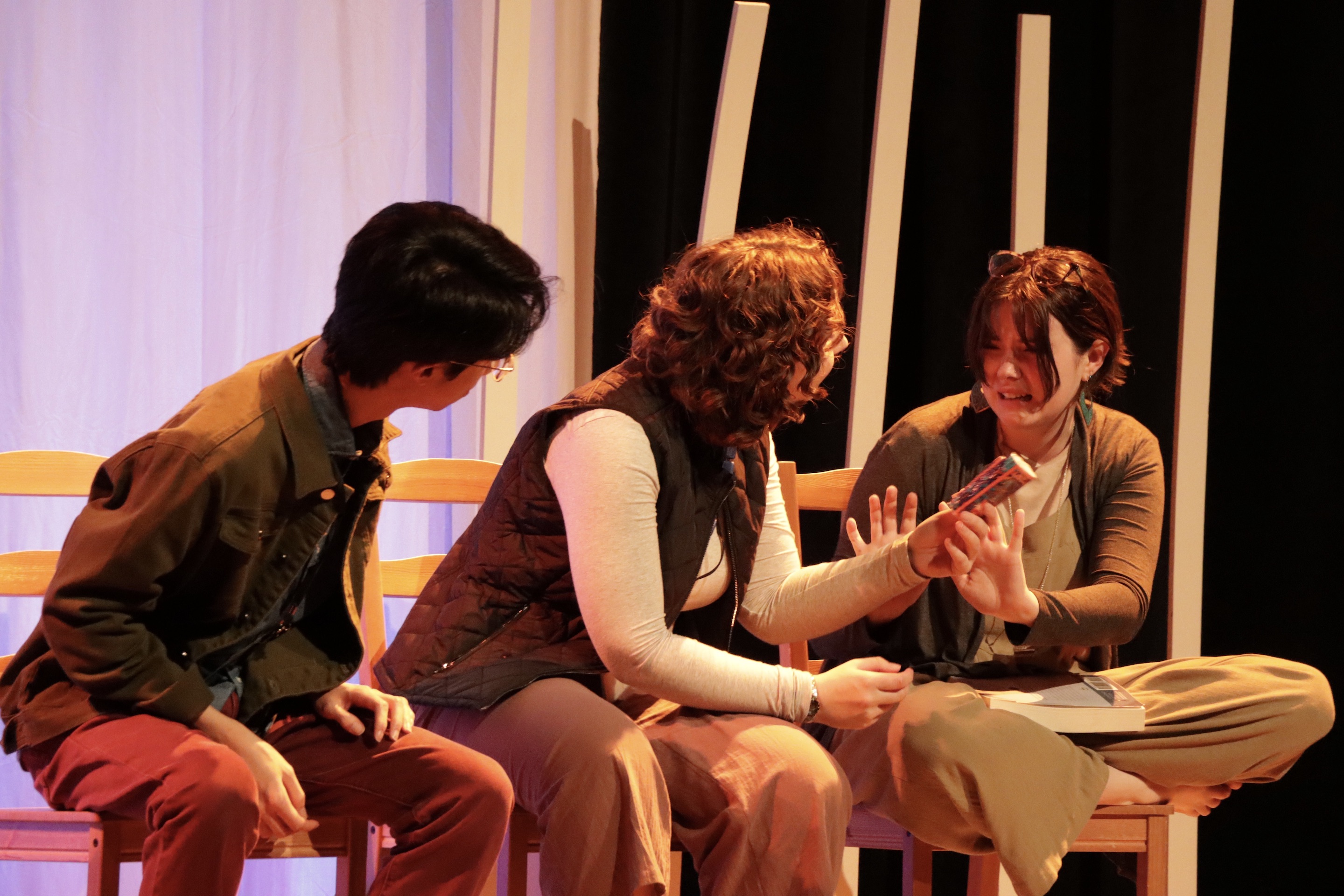
c/o Varia Voloshin
“Small Mouth Sounds,” the creative component of Nina Jakobson’s ’24 senior theater thesis, follows six participants on a five-day silent retreat as they struggle to find their true selves, guided by their unseen meditation leader (Leo Kaplan ’26).
Jakobson stumbled upon the script last spring when her friend Kieran Gettel-Gilmartin ’25, an actor in the production, recommended the Bess Wohl play.
“I was attracted to its physical storytelling,” Jakobson said of the script.
Though sparse, Wohl’s dialogue is irreverent and powerful, hilarious and understated, inane and loaded. To expand the world past its spoken representation, Wohl’s script includes five pages of complex character descriptions, the vast majority of which the audience never becomes privy to (one character was a child actor, another a sex therapist, while a third generates a healthy rage each morning by watching Fox News).
“The play’s emotional journey is meticulously organized,” Eliza Bryson ’26, who plays the tortured and yearning Joan, said.
To better understand their characters’ emotional journey, Jakobson asked the cast to participate in a day of silence during the rehearsal process.
“I felt very strongly we could not tell the experience of characters in a silent retreat without going through that ourselves,” Jakobson said. “The point of the silent day was to show the human urge to constantly communicate with each other. We don’t need words.”
She also asked the cast to write down their intentions for the silence observation, and then burn them, just like their characters. To prepare further, Jakobson attended a five-day silent retreat at the Zen Mountain Monastery in Mount Tremper, N.Y., just before rehearsals began.
“I was stuck in my own mind,” Jakobson said. “My frustration with it was that I wasn’t having this transcendent experience.”
Isabel Hoffman ’24—who plays Joan’s cynical and unavailable partner, Judy—had attended the same retreat a year earlier. Though the program lasted five days, Hoffman left after three, unable to deal with the “anxiety-inducing silence.”
“Silence is not meant to come easily,” Hoffman said. “To struggle with it is a very human thing.”
Participating in “Small Mouth Sounds,” Hoffman imagined, would help her process the difficulty of silence she found at the retreat.
“At the monastery, I felt alone,” Hoffman said. “During [the cast’s day of silence], I felt held by the group.”
Qiushi (Chris) Tian ’24, who played the trusting and ineffable Jan, enjoyed a similar transition, initially unsure of the effectiveness of mindfulness practices.
“At first I was on the fence,” Tian said. “I just didn’t buy it.”
It is this not-buying-it that generates the comedy of the production.
For Hoffman, “Small Mouth Sounds” parodies the Western pay-to-be-enlightened scheme.
Hoffman and Bryson, partners in the production, said the process of rehearsing pushed them to become their characters, mirroring their gestures and affects off the stage.
“We started having marital beef in real life,” Bryson laughed.
For Jakobson, the humor of the play stems from the comedy of people misunderstanding each other.
“Even in daily conversation, we’re all operating upon some sort of illusion that we understand what the other person is saying,” Jakobson said. “I think what silence does is really bring out the way people throw their assumptions onto one another and miss what’s actually happening.”

c/o Varia Voloshin
Wohl’s script included sparse stage directions, forcing actors to craft their own relations using the outside-in method.
“[The method is when] actors find something in their body before they consider what their character is thinking,” Jakobson explained.
Max Grosman ’26 originates Rodney’s character through this physical understanding. Rodney—a yoga YouTuber whose character description reads: “ageless, fit, and wears lots of man-jewelry, but he is pulling it off”—finds a tryst and ultimately some personal reckoning during the five days. From his first performative bow, Grosman’s physicality deftly demonstrates Rodney’s emotional ineptitude. His increasingly detached relationship with his wife (the symptoms of which result in the production’s most climactic scene) reflects his fear that those once-flexible hips will inevitably age.
Rodney talks only twice, just at the retreat’s end, providing what is perhaps the script’s most meaningless and deflating dialogue. Yet Grosman’s physical performance sincerely blends Rodney’s animal, fearful, spirit with the manipulative knave he has become.
Gettel-Gilmartin similarly creates an emotional throughline in Ned’s movements. Ned is a recovering alcoholic, “bruised outdoor enthusiast” (Gettel-Gilmartin’s precise enunciation of this label drew one of the audience’s biggest laughs), and perhaps most devastatingly, cuckold to his younger brother. Yet Gettel-Gilmartin’s earnest embodiment of Ned’s desires and hope draws out the sad comedy of his everyday struggles. Ned’s pen runs dry, but, nervous and unsure of the social rules, he doesn’t quite know how to ask for a new one; when a possible romantic interest saunters off to the lake with another man, Ned furiously strips down to his boxers and jumps in.
Liz Laurence ’25 played the wounded yet endearing Alicia, whose emotional chaos (and potato chips!) earn a transcendent moment when she hears, possibly for the first time, the message of silence. Laurence’s earnestness both drives the play’s comedy and supports the production’s dark emotional undertones with stinging verve.
While he is never seen on stage, Kaplan performs the retreat leader’s voice with authority and nuance, lending a slightly mystic quality to the production while keeping the cast grounded in reality. Kaplan, too, holds his character’s darker struggles close—the teacher’s ultimate emotional reveal feels deserved and fulfilling.
“If you want to avoid pain, it is impossible,” the teacher tells the retreaters. “Change. Somebody, please. Change.”
After seeing the show Friday night, I spent most of Saturday morning petitioning friends to cancel their plans and attend the production’s closing performance. By noon, I’d convinced myself to return a second time. And I didn’t enjoy it as much. Hearing the dialogue again degraded its organic quality, and I felt restless during the longer nonverbal periods. Expectations fell to reality.
The experience reminded me of last summer, when I participated in a Wesleyan-sponsored Outward Bound trip in Maine. Backpacking with a group of strangers, we followed a similar process of learning and misunderstanding. When I returned home that day, I ran up to my mom, eager to share the experience. And I couldn’t. Whatever it had been was forever trapped somewhere on the Appalachian Trail—the spirit couldn’t exist without its physical home. For a long time, this has deeply saddened me.
Attending “Small Mouth Sounds” a second time, I sat in a different chair and saw a different play, a different audience sitting around me. I picked up different clues and motifs but lost others. I confirmed my suspicion that some places are simply better to sit. It is who we sit with, I felt, not what we sit through.
And after attending a second time, I concluded we’re actually quite lucky to sit only in one chair in real life.
Seeing “Small Mouth Sounds” taught me that we can’t relive each moment: each first kiss, each last goodbye. Because life would irrecoverably fail to live up to our expectations. If we could return to those moments from all the different angles, they would forever fall flat, never quite what you believed or wanted them to have been.
Before the cast interview, Jakobson, Hoffman, and Bryson met at Indian Hill Cemetery for circling, a weekly authentic-relating meditation practice Hoffman organizes.
They are continuing to explore new blockings, trying to fill in the blanks given life’s sparse stage directions.
“The most important thing is to be there for people,” Bryson said.
Thomas Lyons can be reached at tlyons@wesleyan.edu.
Correction note: An earlier version of this article was missing information about the character played by Liz Laurence ’25. This information has been added.
-
temp mail
-
temp mail